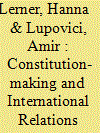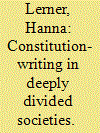| Srl | Item |
| 1 |
ID:
169262


|
|
|
|
|
| Summary/Abstract |
Constitution-making has become an intrinsic component of international politics, nevertheless, international relations scholars largely refrain from theorizing it tending to view formal constitutional drafting as a domestic project. The article proposes an understanding of constitution-making as an international (in addition to national) political phenomenon. We develop a new and comprehensive classification of international influences on constitution-making. We also demonstrate how the empirical study of constitution-making can illuminate overlooked areas of research and challenge existing international relations theories. Our focus here is on the study of international norms. We present three theoretical insights concerning the emergence of international norms, their dissemination, and the role of epistemic communities in facilitating their expansion. We conclude by highlighting how the interaction between international and domestic factors in the crafting of constitutions further challenges the disciplinary distinction between domestic and international politics.
|
|
|
|
|
|
|
|
|
|
|
|
|
|
|
|
| 2 |
ID:
095086


|
|
|
|
|
| Publication |
2010.
|
| Summary/Abstract |
The article addresses the puzzle of how societies still grappling over the common values and shared vision of their state draft a democratic constitution. It argues that an incrementalist approach to constitution-making enabled such deeply divided societies to enact either a written constitution or function with a material constitution by deferring controversial choices regarding the foundational aspects of the polity to future political institutions. It demonstrates how various types of incrementalist constitutional strategies - such as avoidance of clear decisions, the use of ambivalent and vague legal language, or the inclusion of contrasting provisions in the constitution - were deployed in the constitutional drafting of three deeply divided societies: India, Ireland and Israel. By importing the existing ideational conflicts into their constitutions, and by deviating from the common perception of constitution-making as a revolutionary moment, the framers in these three cases enabled their constitutions to reflect the divided identity of 'the people'.
|
|
|
|
|
|
|
|
|
|
|
|
|
|
|
|
| 3 |
ID:
124866


|
|
|
|
|
| Publication |
2013.
|
| Summary/Abstract |
The article addresses the question of what role formal constitutions play in mitigating intense conflicts over the religious character of the state. In contrast to common views in constitutional and political scholarship, it demonstrates that the ideal of liberal constitutionalism is not compatible with the political reality and types of conflicts that characterize religiously divided societies. Analyzing four processes of constitution drafting in which issues of religious law and religious identity were at the heart of the debate-India, Indonesia, Israel, and Turkey-it argues that under deep disagreement over the state's religious character, the drafters adopt either a permissive or a restrictive constitutional approach. While the former implies strategies of constitutional ambiguity, ambivalence, and avoidance in order to allow the political system greater flexibility in future decision making on religion-state relations, the latter approach uses repressive constitutional constraints designed to limit the range of possibilities available to future decision makers. The article further explores the long-term consequences of the two approaches and argues that (1) permissive constitutional arrangements, more than restrictive arrangements, are likely to promote the democratic functioning of future governments; and that (2) permissive constitutional arrangements may facilitate greater freedom of religion, but they are also likely to lead to greater restrictions on freedom from religion, compared with restrictive constitutions.
|
|
|
|
|
|
|
|
|
|
|
|
|
|
|
|